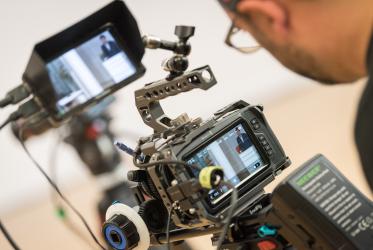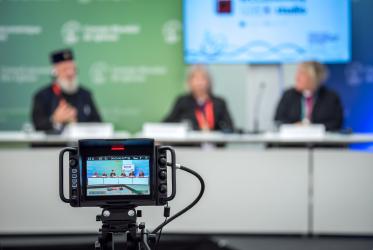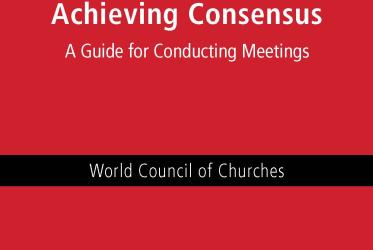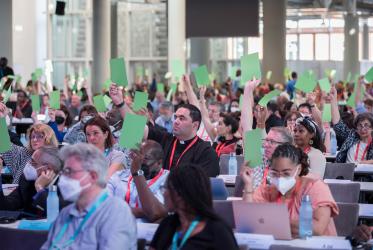RECEPTION AREA
The Ecumenical Centre reception desk is open daily from 08:30 to 17:00 hrs, Monday to Friday, and will provide the following services:
- sale of multiple journey bus cards & phone cards
- requests for taxi service
- lost and found service
- general information about Geneva.
A Central Committee registration/information desk in the entrance hall of the Ecumenical Centre will provide the following services to participants:
- general information about meetings and arrangements
- information about accommodation of participants
- posting of items on the notice boards
- requests for medical attention
- requests for meeting room bookings.
BADGES
Please wear your conference badge at all times in the Ecumenical Centre and during the committee meetings at the Hôtel Ramada Park to enable easy identification and access to meetings. At the end of the meeting you are requested to return your badge to the registration/information desk. Thank you!
NOTICE BOARDS
The notice board next to the information desk will post general information throughout the meeting. The one outside the plenary hall is for any urgent messages or changes to the programme each day. Please submit items for these notice boards to the registration/information desk.
Incoming mail will be distributed in the pigeonholes in the entrance hall daily, Monday to Friday only, and will be available at approximately 10:00hrs.
Outgoing mail already stamped can be placed in the mail box at the Ecumenical Centre reception desk. The Ecumenical Centre mail office (Courrier) on the ground floor is open to sell stamps from 10:00 to 11:30 and from 13:30 to 15:30, Monday to Friday.
The nearest post office (PTT) is located in the International Labour Organization (ILO/BIT) building across the road from the Ecumenical Centre, and is open Monday to Friday, 08:30 to 11:30 hrs and 12:30 to 16:30 hrs.
Mail for staff in the Ecumenical Centre may be placed in a brown internal mail envelope and posted down any mail chute at the end of corridors or handed to the registration/information desk. A small stock of internal mail envelopes is available at the bottom of the pigeonholes. Should the stock be depleted please inform the registration/information desk.
TELEFAXES
Incoming messages will be delivered to participants directly whenever possible or otherwise placed in the pigeonholes. Please be sure to check the pigeonholes at least once each day.
Faxes can be sent from the ILO post office or the hotel. If an urgent fax needs to be sent please contact a WCC staff member.
TELEPHONE CALLS
For incoming calls please give the WCC telephone number to people who may call you:
(+41) 22 791 61 11.
Incoming calls for participants will be received by the Ecumenical Centre reception desk. During plenary sessions, stewards will try to locate those for whom urgent calls are received. At other times, messages will be taken and placed in the pigeonholes.
Outgoing calls can be made from the pay phone on the ground floor outside the Main Hall. It accepts telephone cards ("TAXCARDS") which are available for sale at the Ecumenical Centre reception desk costing Sfr 5.-, 10.- or 20.- each.
Please note that all telephone numbers within Geneva start with 022 (i.e. 022 791 61 11).
CURRENCY EXCHANGE
Currency can be exchanged freely in Switzerland at any bank, change office or your hotel. There is a bank (UBS) in the ILO building which is open from 09:00 to 12:30hrs Monday to Friday.
FINANCES
Participants who are paying their own expenses are asked to settle their account directly with the hotel upon departure.
Requests for reimbursement should be given to the registration/information desk by Thursday, 17 February, lunch time, at the very latest. Receipts have to be provided for reimbursements.
The Finance Office will be open at the following times:
15 February 13:00-14:00 and 15:30-16:00 hrs
16 - 18 February 10:30-11:00; 13:00-14:00; 15:30-16:00
21 February 10:30-11:00, 13:00-14.00; 15:30-16:00
For participants whose hotel bill is paid by the WCC: dinner, bed and breakfast will be covered. All other expenses such as telephone calls, drinks, newspapers, etc. should be settled directly with the hotel upon departure.
ACCOMMODATION
Hotel rooms must be vacated before noon on the day of departure to avoid payment of another day's charges, unless special arrangements are made with the hotel.
Participants who have made their own arrangements for accommodation in Geneva are asked to give the registration/information desk details of where they are staying, so that they can be contacted if necessary.
MEALS
Breakfast and dinner will be taken at participants' place of accommodation.
Lunch will be available in the Ecumenical Centre - hot meals and a small selection of cold plates are available from the main cafeteria and a snack bar will be in operation on the ground floor. In addition there are several restaurants in other organisations in the area where you may eat at prices comparable to those at the Ecumenical Centre. Please consult the registration/information desk for details. Luncheons must be paid in cash. Participants who have applied for a subsidy will receive meal tickets together with their folders.
Coffee and tea will be served daily, free of charge, at 10:30 and 15:30 hrs.
TRAVEL ARRANGEMENTS
The RAPTIM travel agency is situated in the Rhône wing of the Ecumenical Centre on the ground floor (rez) and will take care of reconfirmation of airline tickets. This may also be done at the Swissport desk (Monday-Friday only) at the Hôtel Ramada Park. It is important that all reservations be reconfirmed.
Raptim will also take care of any additional travel arrangements or changes to tickets. For participants whose travel has been arranged by the WCC, Raptim will only be able to make changes to itineraries that do not incur any extra cost.
Raptim's opening hours are:
Monday - Friday 09:00-12:00; 13:30-17:00hrs
Departures
Recommended check-in times at Geneva airport are 60 minutes before scheduled departure for European flights and 90 minutes for international flights.
Those staying at the Hôtel Ramada Park can check in their luggage at the Swissport desk (Monday-Friday only), and travel to the airport using the hotel shuttle service which is available every day, free of charge.
The airport can be reached from the Ecumenical Centre by public bus no 28 direction "Hôpital La Tour". They both leave from the "Crêts-de-Morillons" bus stop. The journey takes approximately 15 minutes; it costs Sfr 3.00. It may be prudent to consult the bus timetable at the Ecumenical Centre reception desk to ensure that you leave early enough.
LOCAL TRANSPORT
A shuttle bus service will run between the Hôtel Ramada Park and the Ecumenical Centre on days when the meetings take place there. Please check the notice board for the timetable.
The public bus system is reliable and easy to use. The buses operate on the honour system: you must buy a ticket before boarding the bus from the machine at the bus stop. The fare is Sfr 3.00 which allows you to travel as much as you wish and on more than one bus within a one-hour period. Multiple trip cards "cart@bonus" are on sale at the reception desk and in newsagents' shops and kiosks.
Bus F (direction Cornavin from the stop opposite the Ecumenical Centre) and 5 (direction Hôpital - from the stop across route de Ferney) can take you from the Ecumenical Centre downtown. Buses do not run after midnight.
The Ecumenical Center reception desk will call a taxi on request, or you can telephone the central taxi number 022 3202 202. The cost is approx. Sfr.3.00/km (plus basic tax Sfr.8.00) or about Sfr.20 for a trip to the Hôtel Ramada Park, downtown or the airport.
WORSHIP
Daily worship will be held in the Chapel from 08.30 to 09.00 hrs.
DOCUMENTS
Documents will be distributed to CC members directly at their places in the Main Hall. Other participants will receive their copies as they enter the hall.
The colour of the documents indicates the language or subject, as follows:
English white
French green
German pink
Spanish grey
Administration blue
MEETING AND OFFICE LOCATIONS
Plenary sessions of Central Committee Main Hall
Worship Chapel
Programme Committee (17, 18, 19 February Hôtel Ramada Park
Policy Reference Committee II (17, 18, 19 February) Hôtel Ramada Park
Press Conferences Main Hall
The meeting rooms for other committees will be announced at a later stage.
Regional meetings:
- Africa Salles II&III
- Asia chapel
- Caribbean Salle à manger I
- Europe Main Hall
- Latin America Library
- Middle East Salle VIII
- North America Salle IV
- Pacific Salle V
If you wish to reserve a room for a special meeting, please contact the registration/information desk.
Offices
Conference Secretary - Mr Scarff Lac 124 (1st floor)
DocumentationOffice - Ms Ergas Cinema
Finance & Reimbursements - Ms Yasmina Visinand Cash office (entrance hall)
Interpreters - Ms Stranz Library
Translators - Ms Marie-Luz Cavagna Library
Stewards - Ms Maxson Open House
Press Room Salle I
Typing pool - Ms Arndt, Ms Kocher Salle VII (Salève)
BOOKSHOP
The Ecumenical Centre bookshop sells pens and pencils. Newspapers and a larger selection of stationery are available at the ILO (Naville shop), or the airport. Newspapers are also available from the kiosk at the Hôtel Ramada Park.
Bookshop opening hours are: Monday - Friday - 08:30-17:00hrs
MEDICAL ATTENTION
Anyone requiring medical or dental services should contact the registration/information desk.
They will have a small stock of basic first aid supplies such as aspirin, sticking plaster, etc. and can also advise if further professional help is required.
SMOKING
Please note that smoking is not allowed in the Ecumenical Centre.
ABOUT STEWARDS
A steward is an invaluable ecumenical resource, a young person committing time, energy and vision to building up the ecumenical movement in all its aspects - churches, peoples' movements and ecumenical youth movements.
Stewards form together a mutually accountable and responsible community. They work together with staff and Central Committee participants on the specific tasks during the meeting. This year the stewards' community is 27 young people from 21 countries committed in their faith and praxis of an ecumenical vision. They seek an experience that broadens their horizons and may indeed change their lives.
The Stewards Programme of the World Council of Churches was created by the first General Secretary, W.A. Visser 't Hooft. He got the idea from William Temple who often said he began his ecumenical career by showing delegates to their seats at the 1910 World Mission Conference. Today the Stewards Programme is one of the WCC Youth activities. Continuing and building upon Visser't Hooft's vision, the programme has three aspects:
a) intentional ecumenical learning designed to build ecumenical consciousness and global solidarity;
b) participation and presence of young people at major meetings of the WCC as yeast of the ecumenical loaf;
c) support for the smooth running of the meeting by performing specific tasks.
Selection of stewards is an open process relying on detailed application forms and recommendations from churches, partner ecumenical bodies and ecumenical movements. Selection criteria prioritise involvement denominationally and ecumenically, as well as the capacity to perform the tasks of stewardship. Balances of confession, gender, region and race are actively sought.
Prior to the Central Committee meeting stewards have taken part in an exposure programme organised by the Swiss Ecumenical Youth Service followed by a 6-day training seminar on ecumenical formation. Stewards, during this seminar, commit themselves to organise an ecumenical project in their respective communities.
Being a steward means, first and foremost, hard work. The work done by stewards is often exhausting, intense and under the pressure of deadlines. There are plenty of tasks - some interesting, some less so. But in all of them, stewards become part of a community with shared action and vision.
In this meeting, stewards are working in the following areas: Communication (which involves work in the Bookshop, Photo & Visual Arts, Press, Radio Production); Conference Office, Main Hall, Documentation, Language Service, Message Service, and Worship.
Stewards come to serve the Central Committee as a whole. Therefore, they should not be requested to perform tasks by individual delegates unless this is coordinated through the WCC staff working with the stewards.
Both stewards and Central Committee participants always benefit each other from free and frank discussions; these opportunities are considered as one of the highlights of the meeting. The individual steward will always have something to say: with the experience of community a rich overlay is added. It is very worthwhile to take time to meet stewards and include them in conversations.
Stewards return home after a "peak" experience. Today, many who have been stewards in recent years stay regularly in contact. Others still meet from time to time in gatherings of their churches, or ecumenically. Others bring a little bit of the experience of an intentional and international ecumenical community to their daily activities. Like all of us, they face the challenge of making the international ecumenical experience relevant to the places and people around them. In the end, the strength and support of local churches, ecumenical youth networks and communities determines how the seeds planted in the Stewards Programme take root in the stewards' own soil.



